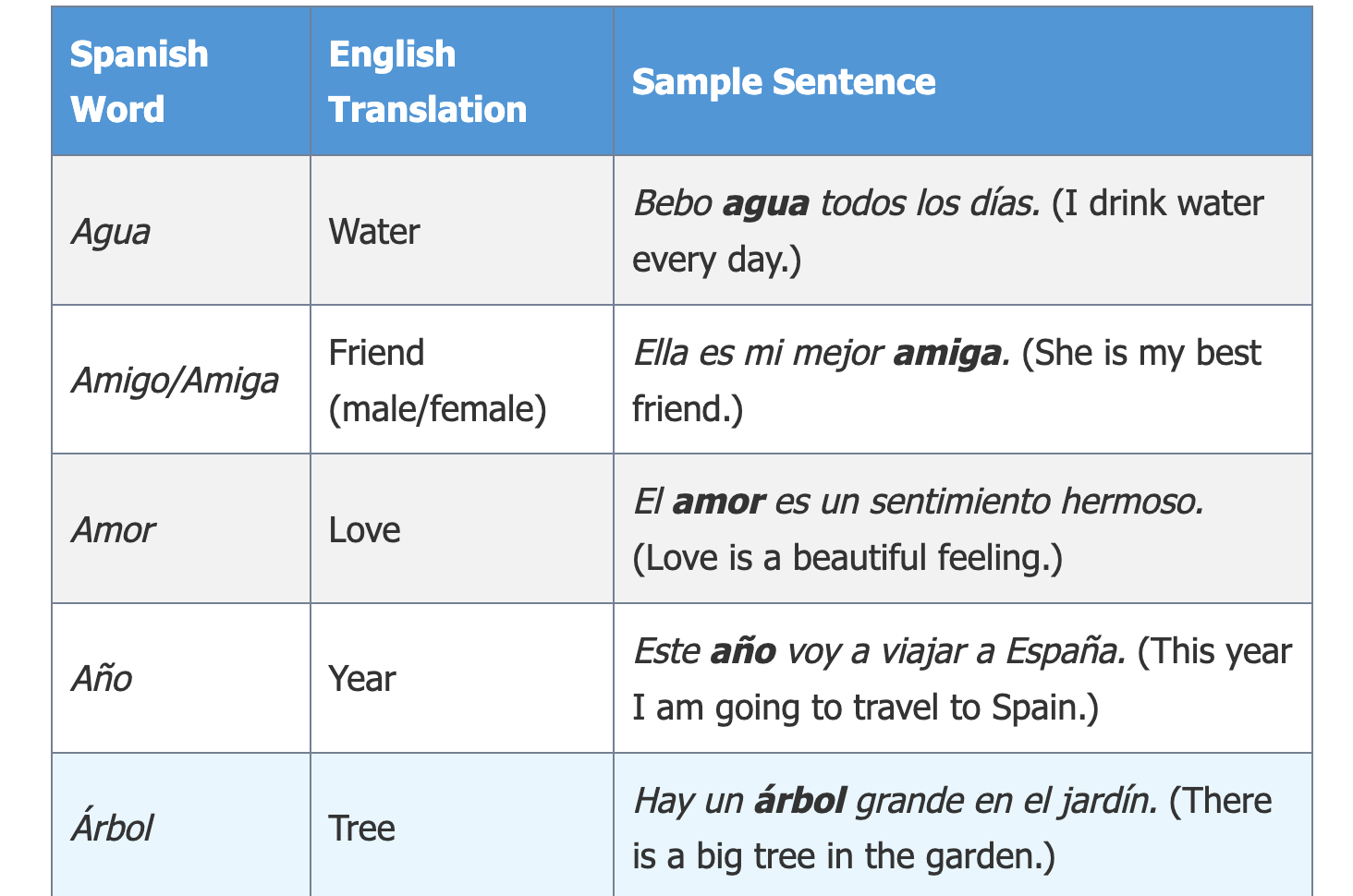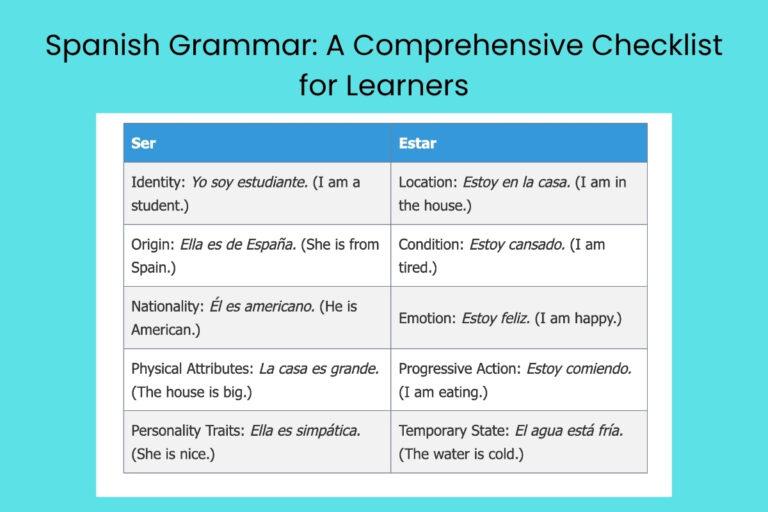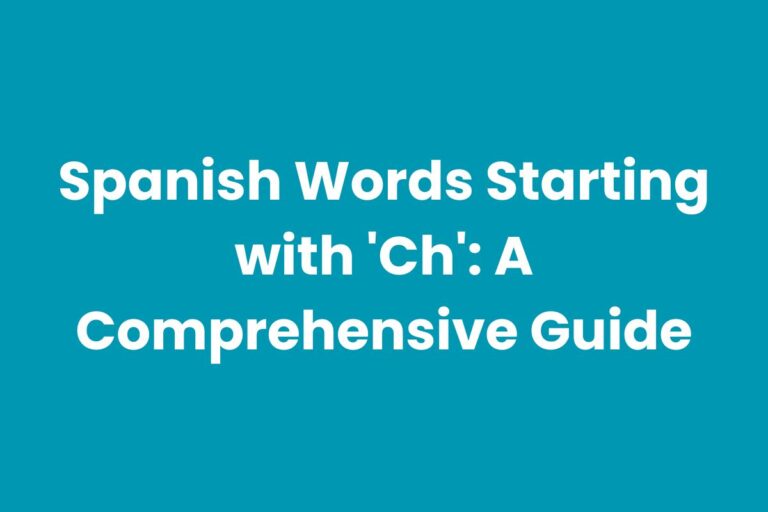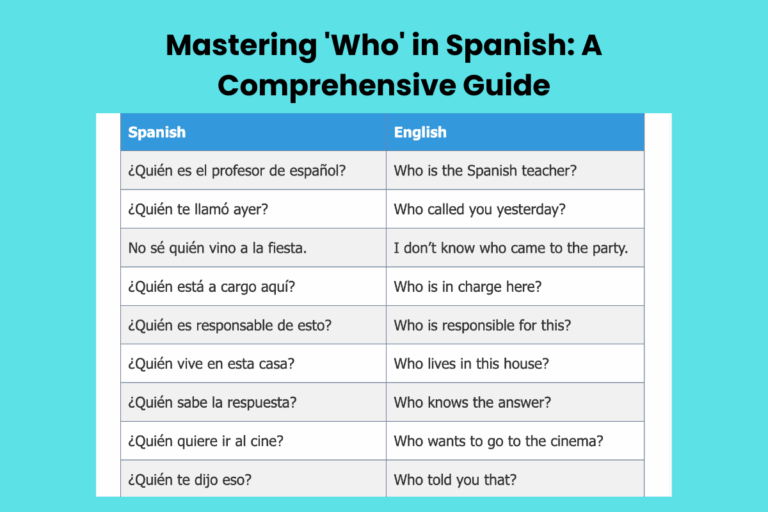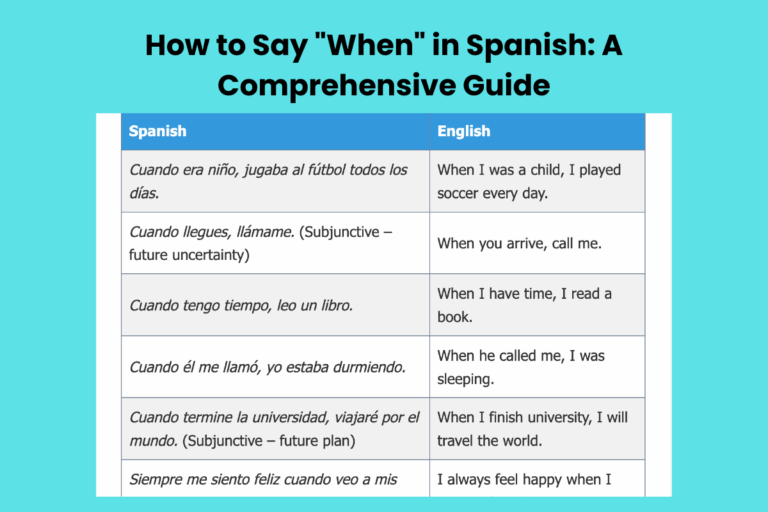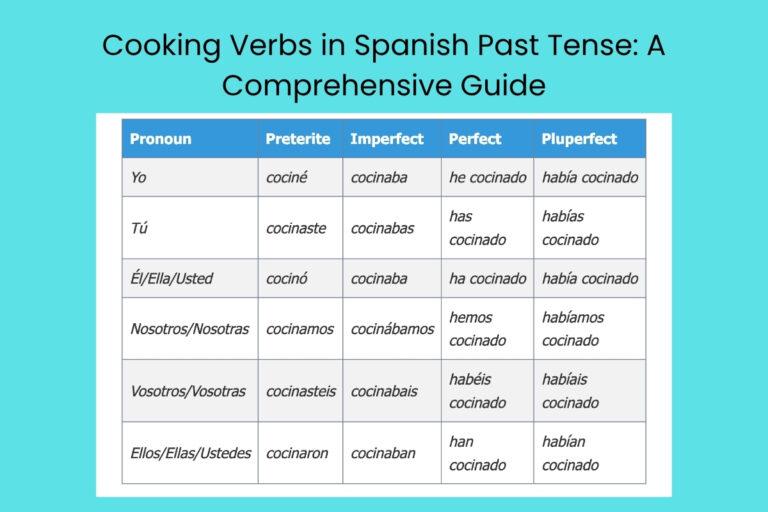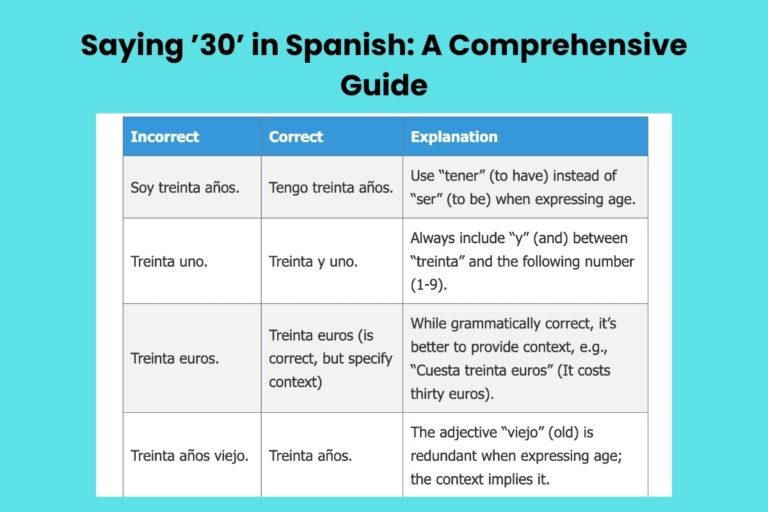Spanish Words Starting with A: A Comprehensive Guide
Understanding Spanish vocabulary is crucial for effective communication in the language. Words beginning with the letter “A” are particularly important, as they encompass a wide range of meanings and grammatical functions.
This article provides a comprehensive overview of common Spanish words starting with “A,” their usage, and examples to help learners improve their Spanish language skills. It benefits students of all levels, from beginners to advanced speakers, who want to expand their vocabulary and refine their understanding of Spanish grammar.
Table of Contents
- Introduction
- Definition of Spanish Words Starting with A
- Structural Breakdown
- Types and Categories of “A” Words
- Examples of Spanish Words Starting with A
- Usage Rules
- Common Mistakes
- Practice Exercises
- Advanced Topics
- FAQ
- Conclusion
Introduction
The Spanish language, rich in history and culture, boasts a vast vocabulary. Mastering this vocabulary is essential for fluency.
Words that begin with the letter “A” are among the most frequently used and cover a wide spectrum of meanings, from everyday objects to abstract concepts. This guide aims to provide a thorough exploration of these words, offering definitions, examples, and practical advice for learners of all levels.
By understanding the nuances of these “A” words, students can significantly improve their comprehension and expression in Spanish.
Definition of Spanish Words Starting with A
Spanish words starting with the letter “A” encompass various parts of speech, each with its unique function in a sentence. These words can be nouns (things, places, or ideas), verbs (actions or states of being), adjectives (describing words), adverbs (modifying verbs, adjectives, or other adverbs), or prepositions (linking words).
Understanding the grammatical role of each word is crucial for proper usage and comprehension. These words cover a broad range of topics, reflecting the diverse aspects of life and thought.
The letter “A” is fundamental in the Spanish alphabet, and mastering words that begin with it is a cornerstone of language acquisition.
Structural Breakdown
The structure of Spanish words starting with “A” follows the general rules of Spanish morphology. Many of these words are derived from Latin, reflecting the historical roots of the Spanish language. The initial “A” can be followed by a vowel or a consonant, leading to a wide variety of phonetic combinations. Some words may have prefixes attached to the root, altering their meaning. For example, the prefix a- can be added to a verb to indicate that an action is being performed. Understanding these structural elements can aid in deciphering the meaning of unfamiliar words. Recognizing common prefixes and suffixes can unlock a deeper understanding of Spanish vocabulary.
Types and Categories of “A” Words
Spanish words starting with “A” can be categorized into different parts of speech. Each category has specific grammatical rules and functions.
Understanding these distinctions is essential for using the words correctly in sentences.
Nouns
Nouns are words that represent people, places, things, or ideas. In Spanish, nouns have gender (masculine or feminine) and number (singular or plural).
The gender of a noun often determines the form of articles and adjectives that modify it.
Verbs
Verbs express actions, states of being, or occurrences. Spanish verbs are conjugated according to tense, mood, and person.
Verbs starting with “A” are no exception and follow the standard conjugation patterns.
Adjectives
Adjectives describe nouns. In Spanish, adjectives must agree in gender and number with the nouns they modify.
Adjectives starting with “A” can add descriptive detail and nuance to sentences.
Adverbs
Adverbs modify verbs, adjectives, or other adverbs. They provide information about how, when, where, or to what extent an action is performed.
Adverbs starting with “A” can add precision and clarity to descriptions.
Prepositions
Prepositions connect nouns or pronouns to other words in a sentence, indicating relationships such as location, direction, or time. While there are fewer prepositions starting with “A” compared to other parts of speech, they are still essential for constructing grammatically correct sentences.
Examples of Spanish Words Starting with A
The following sections provide examples of Spanish words starting with “A,” categorized by part of speech. Each example includes the Spanish word, its English translation, and a sample sentence.
Nouns Examples
Below is a table showing example nouns starting with the letter “A”. Each word is accompanied by its English translation and a sample sentence.
| Spanish Word | English Translation | Sample Sentence |
|---|---|---|
| Agua | Water | Bebo agua todos los días. (I drink water every day.) |
| Amigo/Amiga | Friend (male/female) | Ella es mi mejor amiga. (She is my best friend.) |
| Amor | Love | El amor es un sentimiento hermoso. (Love is a beautiful feeling.) |
| Año | Year | Este año voy a viajar a España. (This year I am going to travel to Spain.) |
| Árbol | Tree | Hay un árbol grande en el jardín. (There is a big tree in the garden.) |
| Aire | Air | Necesito tomar un poco de aire fresco. (I need to get some fresh air.) |
| Arte | Art | Me gusta mucho el arte moderno. (I really like modern art.) |
| Alma | Soul | Tiene un alma generosa. (He/She has a generous soul.) |
| Animal | Animal | El perro es mi animal favorito. (The dog is my favorite animal.) |
| Aula | Classroom | La aula está llena de estudiantes. (The classroom is full of students.) |
| Avenida | Avenue | Vivo en la avenida principal. (I live on the main avenue.) |
| Ayuda | Help | Necesito tu ayuda con este problema. (I need your help with this problem.) |
| Azúcar | Sugar | ¿Quieres azúcar en tu café? (Do you want sugar in your coffee?) |
| Actitud | Attitude | Su actitud es muy positiva. (His/Her attitude is very positive.) |
| Acuerdo | Agreement | Hemos llegado a un acuerdo. (We have reached an agreement.) |
| Adulto | Adult | Soy un adulto responsable. (I am a responsible adult.) |
| Alimento | Food, Aliment | Este alimento es muy nutritivo. (This food is very nutritious.) |
| Ambiente | Environment | Debemos proteger el ambiente. (We must protect the environment.) |
| Análisis | Analysis | El análisis de los datos es importante. (The analysis of the data is important.) |
| Anuncio | Advertisement | Vi un anuncio interesante en la televisión. (I saw an interesting advertisement on TV.) |
| Apoyo | Support | Agradezco tu apoyo incondicional. (I appreciate your unconditional support.) |
| Arma | Weapon | El uso de armas está prohibido. (The use of weapons is prohibited.) |
| Asunto | Matter, Issue | Tenemos un asunto importante que discutir. (We have an important matter to discuss.) |
| Atención | Attention | Presta atención a las instrucciones. (Pay attention to the instructions.) |
| Ausencia | Absence | Su ausencia se notó en la reunión. (His/Her absence was noticed at the meeting.) |
Verbs Examples
Here is a table with sample verbs starting with “A”, along with their English translations and example sentences.
| Spanish Verb | English Translation | Sample Sentence |
|---|---|---|
| Amar | To love | Yo amo a mi familia. (I love my family.) |
| Andar | To walk | Me gusta andar por el parque. (I like to walk in the park.) |
| Aprender | To learn | Estoy aprendiendo español. (I am learning Spanish.) |
| Abrir | To open | Por favor, abre la ventana. (Please open the window.) |
| Ayudar | To help | Siempre estoy dispuesto a ayudar. (I am always willing to help.) |
| Aceptar | To accept | Debes aceptar sus disculpas. (You should accept his/her apologies.) |
| Aconsejar | To advise | Mi madre me aconsejó que estudiara más. (My mother advised me to study more.) |
| Acordar | To agree | Hemos acordado reunirnos mañana. (We have agreed to meet tomorrow.) |
| Actuar | To act | Él actúa muy bien en la obra. (He acts very well in the play.) |
| Admirar | To admire | Admiro su valentía. (I admire his/her courage.) |
| Admitir | To admit | Debes admitir tu error. (You must admit your mistake.) |
| Afectar | To affect | La noticia le afectó mucho. (The news affected him/her a lot.) |
| Agradecer | To thank, to be grateful | Te agradezco tu ayuda. (I thank you for your help.) |
| Aislar | To isolate | Es importante no aislar a los enfermos. (It’s important not to isolate the sick.) |
| Alcanzar | To reach, to achieve | Quiero alcanzar mis metas. (I want to achieve my goals.) |
| Alegrar | To cheer up, to make happy | Tu visita me alegró el día. (Your visit cheered me up.) |
| Alimentar | To feed | Debemos alimentar a los animales. (We must feed the animals.) |
| Aliviar | To relieve | Este medicamento puede aliviar el dolor. (This medicine can relieve the pain.) |
| Añadir | To add | Puedes añadir sal a la sopa. (You can add salt to the soup.) |
| Anhelar | To long for, to yearn | Anhelo viajar por el mundo. (I long to travel the world.) |
| Animar | To encourage | Debemos animar a nuestros amigos. (We must encourage our friends.) |
| Anunciar | To announce | Van a anunciar los resultados pronto. (They are going to announce the results soon.) |
| Aparcar | To park | No se puede aparcar aquí. (You can’t park here.) |
| Aprobar | To approve, to pass | Espero aprobar el examen. (I hope to pass the exam.) |
| Aprovechar | To take advantage of, to make the most of | Debemos aprovechar esta oportunidad. (We must take advantage of this opportunity.) |
| Arreglar | To fix, to arrange | Voy a arreglar el coche mañana. (I’m going to fix the car tomorrow.) |
Adjectives Examples
The following table lists adjectives starting with the letter “A,” their English translations, and example sentences.
| Spanish Adjective | English Translation | Sample Sentence |
|---|---|---|
| Alto/Alta | Tall | Él es muy alto. (He is very tall.) Ella es muy alta. (She is very tall.) |
| Amable | Kind | Es una persona muy amable. (He/She is a very kind person.) |
| Antiguo/Antigua | Old, Ancient | Este castillo es muy antiguo. (This castle is very old.) |
| Ancho/Ancha | Wide | El río es muy ancho. (The river is very wide.) |
| Amarillo/Amarilla | Yellow | El sol es amarillo. (The sun is yellow.) |
| Aburrido/Aburrida | Boring | La película fue muy aburrida. (The movie was very boring.) |
| Alegre | Happy, Cheerful | Ella siempre está alegre. (She is always cheerful.) |
| Atento/Atenta | Attentive | Es un estudiante muy atento. (He is a very attentive student.) |
| Auténtico/Auténtica | Authentic | Este plato es de cocina auténtica. (This dish is authentic cuisine.) |
| Apasionado/Apasionada | Passionate | Es un apasionado del fútbol. (He is passionate about football.) |
| Agradable | Pleasant | El clima es muy agradable hoy. (The weather is very pleasant today.) |
| Absurdo/Absurda | Absurd | Es una idea absurda. (It’s an absurd idea.) |
| Activo/Activa | Active | Es una persona muy activa. (He/She is a very active person.) |
| Adecuado/Adecuada | Appropriate | Esta ropa es adecuada para la ocasión. (These clothes are appropriate for the occasion.) |
| Admirado/Admirada | Admired | Es un artista muy admirado. (He is a very admired artist.) |
| Adorable | Adorable | El bebé es adorable. (The baby is adorable.) |
| Agresivo/Agresiva | Aggressive | Su comportamiento es muy agresivo. (His/Her behavior is very aggressive.) |
| Afortunado/Afortunada | Fortunate, Lucky | Soy muy afortunado de tenerte. (I am very lucky to have you.) |
| Amargo/Amarga | Bitter | El café está muy amargo. (The coffee is very bitter.) |
| Amplio/Amplia | Wide, Spacious | La casa es muy amplia. (The house is very spacious.) |
| Animado/Animada | Lively, Animated | La fiesta estuvo muy animada. (The party was very lively.) |
| Ansioso/Ansiosa | Anxious | Estoy ansioso por verte. (I am anxious to see you.) |
| Apto/Apta | Suitable, Apt | Este lugar es apto para niños. (This place is suitable for children.) |
| Arriesgado/Arriesgada | Risky | Es un plan muy arriesgado. (It’s a very risky plan.) |
| Asombroso/Asombrosa | Amazing, Astonishing | La vista es asombrosa. (The view is amazing.) |
Adverbs Examples
The following table provides examples of adverbs starting with “A,” their English translations, and corresponding sentences.
| Spanish Adverb | English Translation | Sample Sentence |
|---|---|---|
| Ahora | Now | Lo necesito ahora. (I need it now.) |
| Ayer | Yesterday | Llegué ayer. (I arrived yesterday.) |
| Aquí | Here | Estoy aquí. (I am here.) |
| Allí | There | Está allí. (It is there.) |
| Así | Like this, So | Hazlo así. (Do it like this.) |
| Apenas | Hardly, Barely | Apenas puedo oírte. (I can hardly hear you.) |
| Adelante | Forward, Ahead | Sigue adelante. (Keep going forward.) |
| Afuera | Outside | Está lloviendo afuera. (It’s raining outside.) |
| Aparte | Aside | Deja eso aparte. (Leave that aside.) |
| Arriba | Up, Above | Mira arriba. (Look up.) |
Usage Rules
The usage of Spanish words starting with “A” follows the general rules of Spanish grammar. Nouns must agree in gender and number with their articles and adjectives.
Verbs must be conjugated correctly according to tense, mood, and person. Adjectives must agree in gender and number with the nouns they modify.
Adverbs typically do not change form, but their placement in a sentence can affect the meaning. Prepositions require careful attention to the relationships they indicate.
It’s important to practice using these words in context to master their correct usage. Consulting a dictionary or grammar guide can be helpful when in doubt.
Pay special attention to the gender of nouns, as it affects the articles and adjectives used with them. For example, el agua (the water) is masculine, even though it ends in “a,” which is typically associated with feminine nouns. Remember to conjugate verbs accurately, paying attention to irregular verbs. Adjective placement can also affect the meaning of a sentence. For example, un hombre pobre (a poor man) is different from un pobre hombre (an unfortunate man).
Common Mistakes
One common mistake is confusing the gender of nouns. For example, using la agua instead of el agua. Another mistake is incorrect verb conjugation, such as using the wrong tense or person. A frequent error with adjectives is failing to make them agree in gender and number with the nouns they modify. It’s also common to misuse adverbs, especially in terms of placement within a sentence. Below are some examples of common mistakes and their corrections.
| Incorrect | Correct | Explanation |
|---|---|---|
| La agua es clara. | El agua es clara. | “Agua” is a masculine noun, so it requires the masculine article “el.” |
| Yo amar tu. | Yo te amo. | The verb “amar” needs to be conjugated correctly, and the pronoun needs to be placed correctly. |
| El libro es aburrida. | El libro es aburrido. | The adjective “aburrido” must agree in gender with the masculine noun “libro.” |
Practice Exercises
Complete the following sentences with the correct form of the Spanish word starting with “A” provided in parentheses.
- Yo quiero beber un vaso de ________ (agua).
- Ella es mi ________ (amiga) más querida.
- El ________ (año) pasado viajé a México.
- El ________ (árbol) es muy alto.
- Necesito ________ (ayuda) con mi tarea.
- Voy a ________ (aprender) español este año.
- Por favor, ________ (abrir) la puerta.
- Es una persona muy ________ (amable).
- El coche es ________ (amarillo).
- Lo necesito ________ (ahora).
Answers:
- agua
- amiga
- año
- árbol
- ayuda
- aprender
- abre
- amable
- amarillo
- ahora
More Practice Exercises:
Choose the correct word from the options provided to complete the sentence.
- ¿Quieres ________ en tu café? (a. azúcar, b. agua, c. amigo)
- Me gusta ________ por el parque. (a. amar, b. andar, c. abrir)
- El clima es muy ________ hoy. (a. amable, b. agradable, c. alto)
- Está lloviendo ________. (a. aquí, b. allí, c. afuera)
- Debo ________ mi error. (a. admitir, b. actuar, c. admirar)
- La casa es muy ________. (a. ancho, b. amplio, c. antiguo)
- Estoy ________ por verte. (a. ansioso, b. activo, c. apto)
- Ella siempre está ________. (a. absurdo, b. alegre, c. agresivo)
- Es una idea ________. (a. adecuado, b. admirable, c. absurda)
- Debemos ________ esta oportunidad. (a. aparcar, b. aprobar, c. aprovechar)
Answers:
- a. azúcar
- b. andar
- b. agradable
- c. afuera
- a. admitir
- b. amplio
- a. ansioso
- b. alegre
- c. absurda
- c. aprovechar
Advanced Topics
For advanced learners, exploring the etymology of Spanish words starting with “A” can be fascinating. Many of these words have Latin or Arabic origins, reflecting the historical influences on the Spanish language. Investigating idiomatic expressions that use “A” words can also deepen understanding. For instance, the phrase “a partir de” (starting from) is a common idiom. Additionally, analyzing the use of “A” words in literature and poetry can provide insights into their nuanced meanings and cultural significance. Studying regional variations in vocabulary can also be beneficial for advanced learners.
FAQ
- Q: Why is it important to learn Spanish words starting with “A”?
A: Words starting with “A” are fundamental and frequently used in Spanish. Mastering them is crucial for building a strong vocabulary base and improving overall language proficiency.
- Q: How can I improve my pronunciation of Spanish words starting with “A”?
A: Practice listening to native speakers and imitating their pronunciation. Pay attention to the stress patterns of words and use online resources to hear the correct pronunciation of individual words.
- Q: Are there any common prefixes that start with “A” in Spanish?
A: Yes, the prefix a- is common, often indicating direction or proximity. For example, acercar (to bring closer).
- Q: How do I determine the gender of a Spanish noun starting with “A”?
A: While many nouns ending in “a” are feminine, there are exceptions. It’s best to learn the gender of each noun individually and use articles (el or la) to reinforce your understanding.
- Q: What are some common irregular verbs starting with “A” in Spanish?
A: While not all verbs starting with “A” are irregular, “abrir” (to open) has an irregular past participle (abierto). Be sure to check verb conjugations carefully.
- Q: How does the placement of adjectives starting with “A” affect the meaning?
A: Like other adjectives, the placement can change the meaning. Un antiguo amigo (a former friend) differs from un amigo antiguo (an old friend, in terms of age).
- Q: Are there any regional variations in the usage of Spanish words starting with “A”?
A: Yes, certain words may be more common in specific regions. For instance, some slang terms or colloquial expressions may vary from country to country.
- Q: How can I best memorize Spanish words starting with “A”?
A: Use flashcards, create mnemonic devices, practice writing sentences, and immerse yourself in the language through reading, listening, and speaking.
- Q: What is the difference between “aquí” and “allí”?
A: “Aquí” means “here,” indicating a location close to the speaker. “Allí” means “there,” indicating a location farther away from the speaker.
- Q: How can I practice using “A” words in everyday conversation?
A: Make a conscious effort to incorporate “A” words into your daily conversations. Write short dialogues or stories using these words, and seek opportunities to speak with native Spanish speakers.
Conclusion
Mastering Spanish words starting with “A” is a significant step towards achieving fluency in the language. By understanding the different types of “A” words, their usage rules, and common mistakes to avoid, learners can improve their comprehension and expression skills.
Consistent practice and exposure to the language are key to solidifying this knowledge. Remember to focus on pronunciation, gender agreement, and verb conjugation to ensure accuracy.
With dedication and effort, you can confidently use these words in a variety of contexts and communicate effectively in Spanish.

